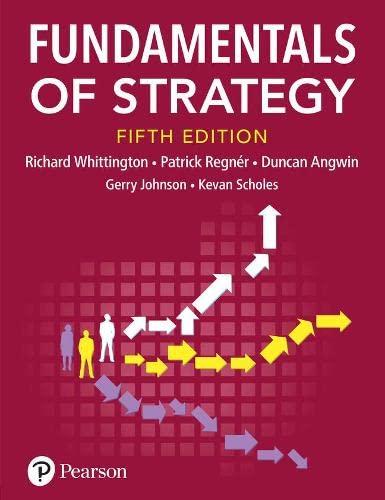1 Carry out a PESTEL analysis of Alibaba at the time of the case. Evaluate the balance...
Question:
1 Carry out a PESTEL analysis of Alibaba at the time of the case. Evaluate the balance of opportunities and threats, using the same kind of figure as in Illustration 2.1. In late 2018, Jack Ma, founder of China’s largest e-
commerce company Alibaba, announced shock news: in the coming year, he would step aside as company Chairman in favour of the Chief Executive, Daniel Zhang. Jack Ma had been Alibaba’s charismatic leader for two decades. But Ma made it clear that he was not disappearing altogether: he remained a major shareholder and would be a permanent member of the 36-strong ‘partnership’ that nominated the majority of the company’s board of directors. A senior banking analyst observed of Ma: ‘He has been the spiritual leader of the company since he founded it, and everyone looks up to him. People call him Teacher Ma. That means people are not looking at him as manager or chief executive or chairman – they are looking to him for guidance.’
The new Chairman and Chief Executive Daniel Zhang was more of a professional manager than the entrepreneurial Ma. Educated in China, he had begun his career in the accounting firms Arthur Andersen and PwC before joining Alibaba in 2007. One of Zhang’s great successes at Alibaba had been the idea of making Singles’ Day in November a national festival of shopping, all served by Alibaba’s online commerce businesses of course.
Recently Zhang has rolled out Singles’ Day internationally, backed by his experience in international firms. During a company-
wide strategy session soon after becoming Chief Executive in 2015, he said: ‘We must absolutely globalize.
We will organize a global team and adopt global thinking to manage the business and achieve the goal of global buy and global sell.’
Jack Ma and colleagues had launched Alibaba in 1999 as China’s first business-to-business portal connecting domestic manufacturers with overseas buyers. Since then, the Group has grown in many directions. 1688.com was founded for business-to-business trade within China.
Alibaba’s Taobao Marketplace serves small businesses and individuals. Tmall.com provides electronic shop fronts to help overseas companies such as Nike, Burberry and Decathlon to reach Chinese consumers. Juhuasuan offers daily deals on everything from toys to laptops. Behind all this are Alibaba’s enormous server farms, which form the basis for another market-leading business, cloud computing.
There is also Alipay, effectively under Ma’s personal control but functioning as the Group’s equivalent to PayPal, which processes most Group transactions. One way or another, it is possible for Alibaba’s customers to trade almost anything: the American security services have even set up a sting operation on Alibaba to catch traders selling uranium to Iran. In 2018, Alibaba had approaching 58 per cent of the e-commerce market in China, the largest e-commerce market in the world. In 2015, Alibaba had invested in the Indian e-commerce business Snapdeal and the following year it bought a majority stake in the Singapore e-commerce business, Lazada. The company also had strong positions in Brazil and Russia. International e-commerce represented nearly 7 per cent of the company’s sales in the last quarter of 2018 (about $1,247m out of total quarterly sales of $17,057m: see also Table 1).
Step by Step Answer:

Fundamentals Of Strategy
ISBN: 9781292351377
5th Edition
Authors: Richard Whittington, Patrick Regner, Duncan Angwin, Gerry Johnson, Kevan Scholes





